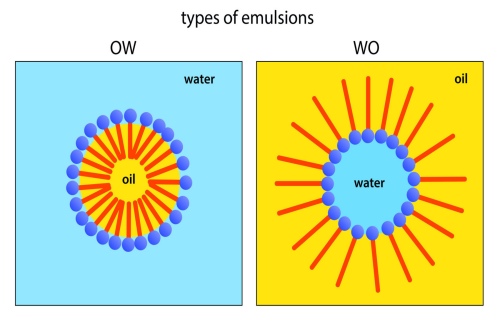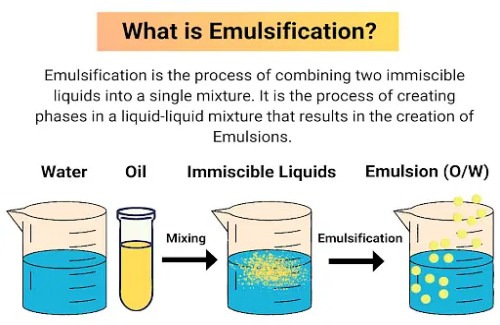Checking Out Various Kinds of Emulsifiers and Their Applications Across Industries
Emulsifiers play a crucial duty in various markets, making certain products preserve their wanted structure and stability. You may be stunned to discover the distinctions between natural and synthetic emulsifiers, each bringing one-of-a-kind advantages to the table.
What Are Emulsifiers?
Emulsifiers are vital compounds that help mix two immiscible fluids, like oil and water, creating a stable mix. These compounds lower the surface tension between the fluids, enabling them to mix extra successfully. You typically come across emulsifiers in everyday items, from salad dressings to lotions. When you whip up a luscious vinaigrette, for instance, these agents maintain the oil and vinegar from dividing, ensuring a smooth texture.
In food manufacturing, emulsifiers improve the mouthfeel and stability of items, making them more delightful. You might not realize it, but they additionally play a considerable role in improving rack life, preventing splitting up, and maintaining look. In cosmetics, emulsifiers assist produce glamorous structures, permitting for even application and absorption. Overall, understanding emulsifiers can help you value the scientific research behind the items you use daily, showcasing their importance in various sectors.
Sorts of Emulsifiers: Natural vs. Synthetic
When considering emulsifiers, it is essential to recognize the difference in between all-natural and synthetic options. All-natural emulsifiers, originated from plant or animal sources, commonly interest those looking for much healthier, a lot more environmentally pleasant products. Examples include lecithin from soybeans and beeswax, which can supply stability in food and aesthetic formulations.

Choosing between natural and artificial emulsifiers steams down to your details demands. Ultimately, understanding your requirements will assist you pick the appropriate emulsifier for your task.

Devices of Activity: Just How Emulsifiers Work
Understanding the differences in between all-natural and synthetic emulsifiers establishes the phase for exploring how these materials feature. Emulsifiers function by decreasing the surface area stress between 2 immiscible liquids, like oil and water.
As you mix, the emulsifiers create an obstacle around oil droplets, preventing them from integrating. By comprehending these systems, you can much better value the critical role emulsifiers play in various applications, from cosmetics to drugs, ensuring the preferred structure and stability in items you use every day.
Emulsifiers in the Food Market
In the food sector, around 80% of refined foods consist of emulsifiers, highlighting their necessary role in improving texture and security. These ingredients assist mix oil and water, creating smooth, consistent products like salad dressings, sauces, and gelato. When you grab a container of mayonnaise or a container of delicious chocolate syrup, you're experiencing the magic of emulsifiers at work.
Typical emulsifiers like lecithin, mono- and diglycerides, and polysorbates aren't nearly taste-- they improve life span and avoid active ingredient splitting up. This suggests your favorite foods remain fresher and keep their attractive appearance.
You'll likewise discover emulsifiers in baked goods, where they add to moisture retention and crumb structure. By comprehending the influence of emulsifiers, you can appreciate how they elevate your food experiences, making each bite not just tasty yet also consistent. So, following time you appreciate a creamy dip or read here a rich dessert, bear in mind the unseen heroes at the workplace!
Emulsifiers in Cosmetics and Personal Treatment Products
While you could believe of emulsifiers mostly in food, they play a necessary function in cosmetics and individual treatment products as well. These compounds assist blend water and oil, producing smooth, stable formulas in creams, creams, and products. You'll discover emulsifiers in creams, where they assure also circulation of moisturizing ingredients, making them a lot more effective on your skin.
When you use makeup, emulsifiers assist achieve the appropriate texture, enabling products to glide on easily. They additionally boost the service life of items by protecting against splitting up, guaranteeing you get the most out of your favorite things.
Typical emulsifiers in this sector include glyceryl stearate and cetyl alcohol, which not only stabilize formulas but likewise supply skin advantages. Following time you get to for a moisturizer or structure, bear in mind that emulsifiers are quietly working behind the scenes to keep your products effective and enjoyable to make use of.
Emulsifiers in Drugs
Emulsifiers play an essential function in drugs by ensuring that energetic components are uniformly dispersed within liquid solutions. When you're developing oral, topical, or injectable medications, you need emulsifiers to support combinations of oil and water, boosting the bioavailability of the active substances. This security is essential for preserving the efficiency and security of the item throughout its life span.
You might come across several kinds of emulsifiers, like natural ones derived from plant resources or synthetic choices especially created for targeted applications. Each type can influence the appearance, absorption rate, and general performance of the medication.
In addition, emulsifiers can enhance the solubility of inadequately water-soluble medications, making them more healing. Because of this, you can create formulations that are easier to carry out and extra efficient for individuals - Emulsifiers. Understanding the duty his comment is here of emulsifiers will assist you make informed options in pharmaceutical advancement
Emulsifiers in Industrial Applications and Paints
When you consider industrial applications and paints, emulsifiers come to be essential for achieving the desired uniformity and performance of items. They help maintain blends of water and oils, stopping separation and ensuring uniformity. In paint formulas, emulsifiers improve diffusion, enabling pigments to blend effortlessly and supplying a smooth surface.
You'll discover that different sorts of emulsifiers deal with certain demands, such as boosting attachment, minimizing surface stress, or improving sturdiness. In finishings, they assist regulate viscosity, making application less complicated and more reliable.
Beyond paints, emulsifiers play a considerable role in adhesives and sealers, adding to far better bonding and adaptability. Emulsifiers. By selecting the ideal emulsifier, you can substantially improve product quality and performance, making your offerings more competitive on the market. To sum up, emulsifiers are important for maximizing commercial applications, making certain that products fulfill the needs of customers and market criteria alike
Regularly Asked Inquiries
Are Emulsifiers Safe for Consumption in Food Products?
Yes, i thought about this emulsifiers in foodstuff are normally risk-free for consumption. They're tested for safety and security and approved by regulatory companies. You can appreciate foods having emulsifiers without stressing, as they boost appearance and security in your dishes.
Can Emulsifiers Reason Allergies in Some People?
Yes, emulsifiers can create allergies in some individuals. If you're sensitive to specific active ingredients, it's important to read tags very carefully and consult a healthcare professional if you experience any type of unfavorable responses. Remain informed and risk-free!
Just How Do Emulsifiers Influence the Service Life of Products?
Emulsifiers boost the service life of products by maintaining blends, stopping splitting up. They assist preserve texture and flavor, ensuring your products remain attractive and fresh for longer, ultimately minimizing waste and improving your overall experience.
Exist Vegan-Friendly Emulsifiers Available?
Yes, there are a lot of vegan-friendly emulsifiers readily available. You'll discover choices like soy lecithin, sunflower lecithin, and guar gum, which function well in numerous dishes while maintaining your dishes plant-based and delicious.

What Are the Environmental Impacts of Synthetic Emulsifiers?
Artificial emulsifiers can damage communities through contamination and bioaccumulation. They might interrupt water life and add to soil degradation. You need to take into consideration natural options to reduce these environmental effects while preserving product efficiency.
Comments on “Emulsifiers and Product Innovation: Why They’re at the Core of R&D”